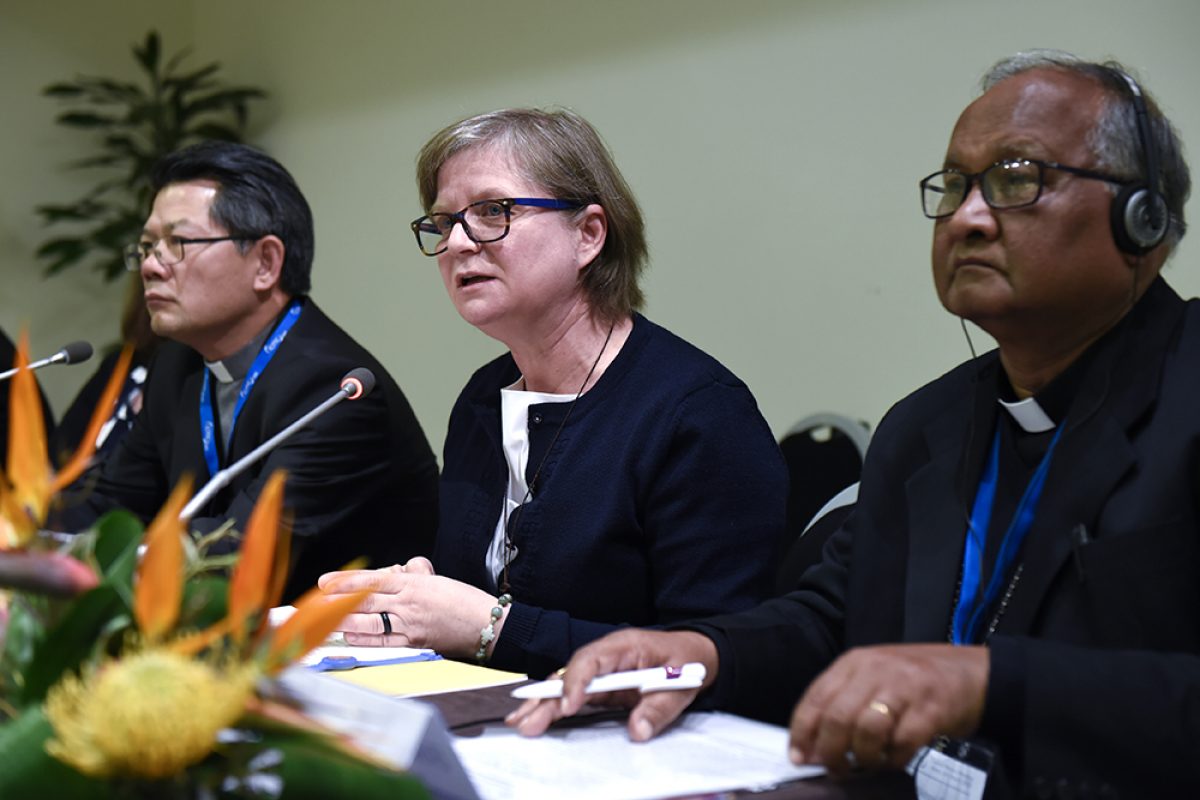Challenges and Hopes Around the World Today

From Australia to Bangladesh to Uganda to Brazil, Catholic agencies are actively striving to rise to the challenges of serving migrants and refugees around the world, Council participants hear.
“In 1980, that is five years after the fall of Saigon, I left Vietnam on a small boat, which was literally packed to the rafters with fellow refugees,” said Bishop Vincent Long Van Nguyen, addressing participants at the International Catholic Migration Commission (ICMC) Council Plenary Meeting held in Rome from 6-8 March.
“The journey took seven long days, and by the third day we had already run out of food, fuel, and water. Hunger, thirst, and despair followed us until the day we were plucked out of the sinking boat and placed in a refugee camp in Malaysia,” he added.
Born and raised during the Vietnam War, today Bishop Long, a second-generation refugee, heads the Diocese of Parramatta in Australia. He was one of the speakers at the closing panel discussion of the ICMC Council meeting.
“We wanted to make sure that this session focused on the people. Not only on issues, not only on big plans, but really on the people who are most affected,” said ICMC Secretary General Monsignor Robert J. Vitillo as he introduced the panelists.
Bishop Long, who chairs the Australian Catholic Migrant and Refugee Office spoke from his experience as a refugee and as a Catholic priest.
The Vietnamese community in Australia is largely the result of “the most tragic and unprecedented exodus in our history,” Bishop Long said, when “millions of Vietnamese refugees took to the sea in order to escape the communist regime.”
But the Vietnamese refugees are just one community woven into the “richly textured tapestry of Australia,” which “has evolved to become a much more dynamic, diverse, and prosperous nation,” thanks to the different groups that compose it.
“I consider it my vocation to tell others that vulnerable people wanting to have a better life, a better future for themselves and their children, should not be seen simply as a burden and a liability to our society,” Bishop Long said. On the contrary, he added, “they can become great contributors and builders of the Church and society.”
Bishop Long acknowledged that in recent times he found himself “a critic of the Australian government’s policy of indefinite detention,” by which asylum seekers are held on Manus Island in Papua New Guinea and on the island Republic of Nauru, northeast of Australia. “I’m sad to say, Australia seems to have failed to live up to its best tradition as a generous and compassionate society.”
Bishop Long concluded: “It is my hope that the Church, both local and universal, especially with the leadership of Pope Francis, can be a voice for the voiceless and advocate for their rights and human dignity.”
Responding to the Needs of Migrants and Refugees
Bishop Gervas Rozario, ICMC Focal Person for Bangladesh, explained how Caritas and the local churches had been active right from the beginning of the Rohingya refugee crisis in August 2017. They offer a broad range of support, from building emergency shelters and latrines to other aspects of site development and improvement.
Bishop Rozario highlighted the visit of Pope Francis to the district of Cox’s Bazaar, where he met with a group of Rohingya refugees and listened to their stories.
Sister Rosita Milesi, Director of the Instituto de Migraciones y Derechos Humanos and ICMC Focal Person in Brazil, shared her concern for the situation of Venezuelans in her country.
Among the four million people who have left Venezuela over the last two years, some 52,000 have entered Brazil. Most of them are stuck in the poor and isolated Northern Amazon region, where they live in very precarious conditions.
Even if the numbers are relatively low, “the truth is that Brazil lacks migration policies as well as structures” to welcome migrants, Sister Milesi said. With authorities being very slow to respond, the Church is actively involved in advocacy and providing services.
Uganda has received people fleeing South Sudan and the Democratic Republic of the Congo since 2016, explained Msgr. Francis Ndamira, Executive Director of Caritas Uganda. The country now hosts about 1.3 million refugees.
Caritas Uganda has provided farm tools and seeds “to about 9,000 households.” The organization also offers training on improved agronomic practices so that households can support themselves and eat a balanced diet; delivers vocational training for youths, and created a support network among refugees and Ugandans.
“If empowered, refugees can support themselves, contribute to sustainable peace in their countries of origin, and to local economies,” concluded Msgr. Ndamira.
The story of New Zealand is a story of migration, said Ms. Julianne Hickey, from Caritas New Zealand. Thus, the organization’s campaign, “We all have a migration story, fostering a culture of encounter” launched in 2016.
Caritas created resources for schools and parishes to reflect on the theme, and invited individuals to share their migration experiences, as well as to value and celebrate all identities.
Churches have been advocating in favor of refugees and migrants, urging the government to accept larger numbers of refugees.
A Modern Form of Slavery
Trafficking people “is a grave violation of human rights,” explained Talitha Kum coordinator Sister Gabriella Bottani. But it is also a huge business, “which is why eradicating it is such a cumbersome and difficult task.”
Talitha Kum comprises 22 anti-trafficking networks in 76 countries, involving mostly Catholic sisters but also lay people.
Around 70% of the victims of human trafficking are women, and about 20% of them are under-age girls, Sr. Bottani said. Trafficking is thus a form of violence against women. Therefore, it is important to rethink relations between men and women, and involve the latter as leaders in the fight against human trafficking.
Watch the panel discuss the challenges faced by the Church in serving migrants and refugees today